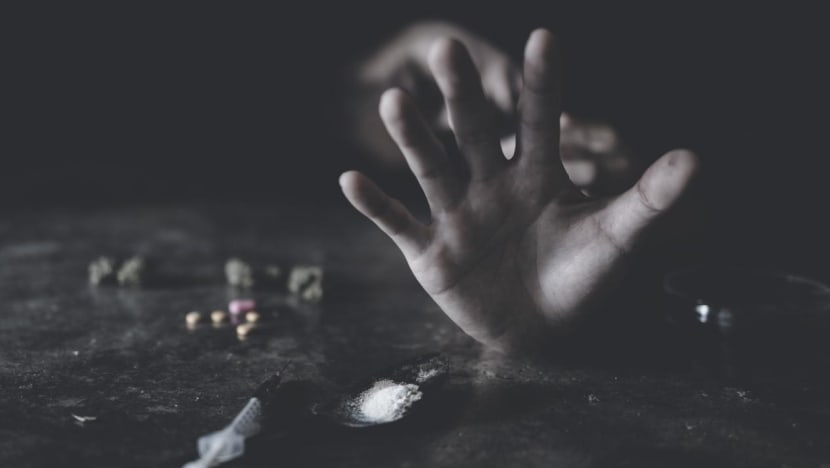Families, loved ones of drug abusers suffer from emotional, social fallout of addiction: Social workers
In one case, the younger brother of a youth drug abuser felt neglected at home, as his parents were always focusing their attention on his sibling's issues, said one social worker.

When people abuse drugs, their families and loved ones suffer indirectly as well, say social workers.(File photo: iStock)

This audio is generated by an AI tool.
SINGAPORE: The families and loved ones of drug abusers also suffer indirectly from drug abuse, as they have to deal with the emotional and social fallout, said social workers.
The inaugural Drug Victims Remembrance Day observance ceremony was held on Friday (May 17), with Law and Home Affairs Minister K Shanmugam emphasising that drug abuse is not victimless.
Ms Kristine Lam, principal social worker and head of youth services at Care Corner, shared about the case of a 20-year-old she was counselling.
His father was also a drug addict, and was filled with guilt and shame as the boy slipped into drugs. He felt it was his fault for normalising his child’s perception of drugs.
“He blamed himself for not being able to catch it early enough,” said Ms Lam, who has worked in the sector for 12 years.
Whenever he lost his temper when the craving came, his mother also became a victim of emotional abuse, and had to be very careful about what to do or say. Even the matter of giving him an allowance had to be considered carefully, as he could spend it on more drugs.
IMPACT ON OTHERS
Amid all this, his younger brother felt neglected at home, as his parents were always focusing their attention on his legal and criminal issues, or trying to locate him and get him to go home.
“The younger brother felt like, ‘Firstly, I'm younger but then nobody takes care of me. Then secondly, I still need to deal with all these threats’,” shared Ms Lam.
It led to him considering whether he should just run away from home and leave the family, she said.
“So there is all this kind of impact which we need to handle and deal with within a household itself,” she said.
Another group of victims were the youth’s friends, who were very shocked upon learning of his situation.
Ms Lam said she had to speak to them to help them process what was happening, before taking them to meet the boy.
The boy was “very aloof and even agitated with them at the beginning”, which left them feeling hurt, she said.

She helped them process what the friendship meant to them, and understand the boy’s perspective, such as the impacts and withdrawal symptoms related to drug use and the stresses that come with police investigations.
The general public will also be indirect victims of drug abuse, said Ms Lam.
“When we see more and more such cases, what does it say of our society? What does it say of us? Does it cause another kid to feel a certain normalisation of drugs use?”
Ms Rachel Loh, senior social worker at Fei Yue, also shared about the case of a 16-year-old girl she worked with a few years back.
“When her parents found out, there were a lot of conflicts at home and a lot of quarrels,” she said.
Her parents were very distressed, and felt a lot of shame and guilt.
“Besides the parents' and child’s relationship being affected, actually it also affected her relationship with her siblings,” said Ms Loh.
She got into drugs as her older sister was also an abuser, which provided her access and information.
“I think when the parents kind of found out a bit about it, they found it difficult to stop her and get her to quit. They were also not sure how to do it," said Ms Loh.
Her younger brother ended up following in her footsteps too. However, he went through a diversionary programme and is back in school after getting his life back on track, she said.
Over a span of around four years, the girl went in and out of the Drug Rehabilitation Centre (DRC) and Reformative Training Centre (RTC).
She is now in the DRC but due to her age, Ms Loh’s team is no longer able to support her recovery process, and handed her case over to their partners in the Singapore Prison Service.
PROVIDING SUPPORT
Ms Loh said it is crucial to provide safe spaces for them to talk about their troubles, because one reason youths start taking drugs is that they are very stressed in life but do not know how to cope.
Ms Lam said a crucial factor in drug use is the accessibility of the drugs to the individual. Growing up in certain spaces means some children are more exposed to drugs at an earlier age.
“In that sense, the environment normalises the use of the substances.”
“People in the circle, usually what they say is that they don't look for drugs, the drugs look for them, because of the social circle,” she shared.
Ms Lam added that peer pressure is a big concern among young people, who typically start trying such substances around the ages of 14 or 15.
“That's really the age where adolescents get into different types of crime, and drugs being one of it. They try alcohol, try cigarettes, try drugs, try sex and all that,” she said.
Social media has also increased the accessibility of drugs, said Ms Lam. For example, there are Telegram group chats where they sell drugs. “Last time you might need to know people, you need to be affiliated to get the access.”
“I had a kid who told me that he has tried many different types and he could tell me the difference between weed, ice, heroin, opium and all that,” said Ms Lam.
For many youths, it is experimental and they are trying just for the sake of fun, but it may lead to them wanting to move on to trying increasingly dangerous substances, she warned.











.jpg?itok=f5Z0wWl9)





